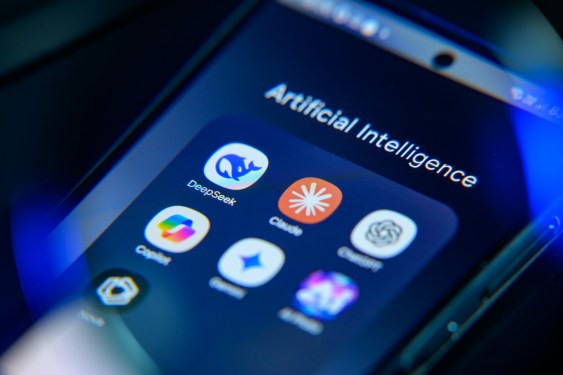According to a new report from venture firm Andreessen Horowitz, rivals like Google’s Gemini, xAI’s Grok, and to a lesser extent Meta AI are closing the gap to OpenAI’s popular AI chatbot, ChatGPT. This report on the consumer AI landscape is the fifth in a series and showcases two and a half years of data on how consumers are using AI products.
For the fifth consecutive time, the same 14 companies appeared on the list of top AI products. These include ChatGPT, Perplexity, Poe, Character AI, Midjourney, Leonardo, Veed, Cutout, ElevenLabs, Photoroom, Gamma, QuillBot, Civitai, and Hugging Face. These companies represent the diverse ways consumers use AI, including for general assistance, companionship, image and video editing, voice generation, productivity, and model hosting.
Five other companies have appeared on every report except the first. These are Claude, DeepAI, JanitorAI, Pixelcut, and Suno, which represent general AI use, companionship, image editing, and music generation.
For the first time in this series of reports, Google gained four spots on the list of top generative AI consumer web products with entries for Gemini, AI Studio, NotebookLM, and Google Labs. These products now have their own separate domains, which allows their growth to be tracked individually. The a16z report relies on data from third-party market intelligence firms like Similarweb for web products and Sensor Tower for mobile app data.
Notably, the number two app Gemini is closing the gap to the number one app ChatGPT on mobile devices, though it still has almost half as many monthly active users. Unsurprisingly, Gemini’s AI technology sees stronger adoption on Android, which makes up nearly 90% of its monthly active user base. On the web, Gemini also holds second place behind ChatGPT, with approximately 12% of ChatGPT’s visit volume.
Google’s AI Studio, a developer-oriented sandbox for building with Gemini models, entered the top 10 list of AI web products in the tenth spot. NotebookLM was ranked number 13, and Google Labs, a destination for AI experiments like Flow, Project Mariner, and Doppl, ranked at number 39.
The report indicates that Meta AI and Grok are also chasing the top AI app, ChatGPT. Grok ranked fourth on the web and number 23 on mobile. This represents rapid growth, considering Grok had no standalone app at the end of 2024. It now has upwards of 20 million monthly active users. In July 2025, Grok’s usage climbed nearly 40% following the release of Grok 4.
Meta’s general assistant ranked number 46 on the web, the same as in March, but it did not make the list of top mobile AI apps. This was partly hampered by the news that Meta AI was sharing some users’ posts publicly on the web without their informed consent.
DeepSeek and Claude saw their mobile growth flatten, with DeepSeek falling off its peak by 22%. On the web, DeepSeek saw an even sharper drop-off, down more than 40% from its peak in February 2025. In contrast, Perplexity and Claude continued to grow.
Other Chinese AI makers also made the top 20 on the web. These include number 9 Quark, Alibaba’s AI assistant, which is number 47 on the mobile list; number 12 Doubao, ByteDance’s general LLM product, which is number 4 on mobile; and number 17 Kimi, a chatbot from Moonshot AI. Each of these has a Chinese website and sees 75% of its traffic coming from China.
Seven additional companies on the web list were developed in China but exported their AI technology globally. These are DeepSeek, Hailuo, Kling, SeaArt, Cutout Pro, Manus, and Monica. On mobile, 22 of the 50 top apps were developed in China, but only three are primarily used in China. Top players in this category include Meitu, ByteDance, Gauth, and Hypic.
Vibe-coding startups Lovable and Replit both debuted on the main list this time, having not made the cut on the a16z list published back in March. Websites built and published via Replit and Lovable without custom domains appear under traffic for their respective app domains, which helped them gain traction.
The report also highlighted AI apps on the brink of making the top list. These include PixAI, bolt, Blackbox AI, Clipchamp, and Getliner on the web, and Talkie, Seekee, Photo AI, AI Mirror, and Arvin on mobile. The firm notes that the current mobile list already features more newcomers than before, with 14 new apps. This shift occurred as major app stores cracked down on ChatGPT copycats and clones, allowing more original apps to find their footing.

